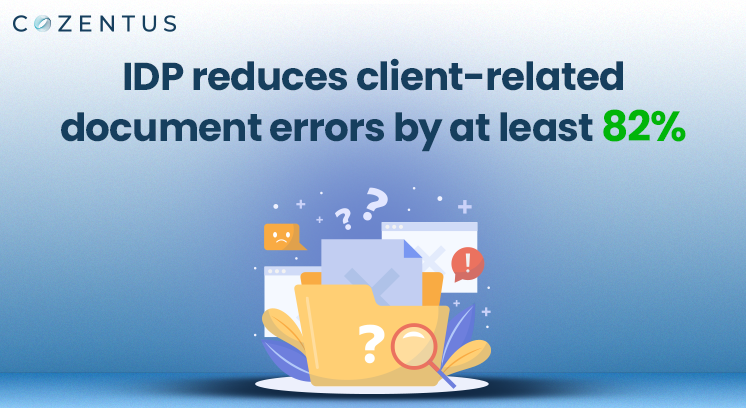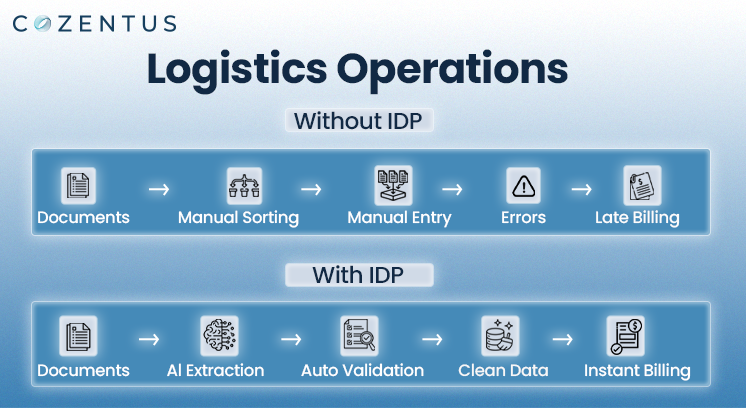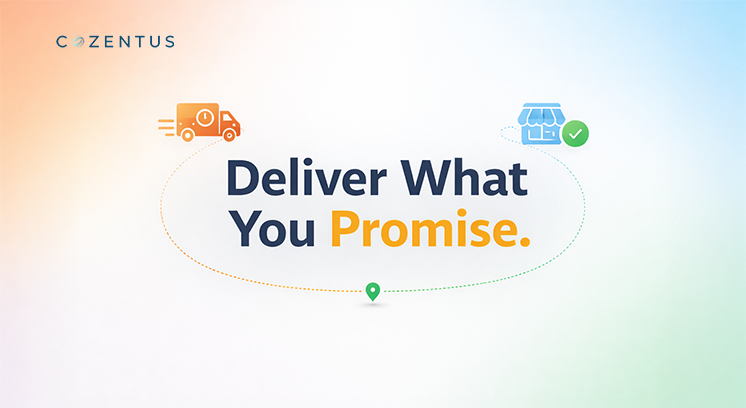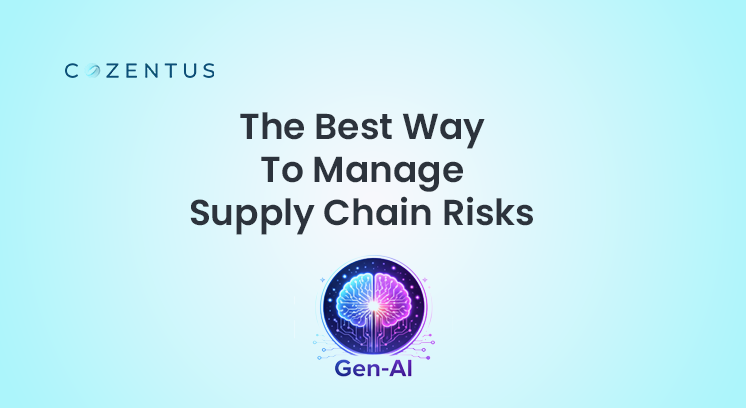Paperwork Slows Down Logistics
Behind all the innovations in logistics, such as visibility platforms, automation, and AI control towers, paper still controls the speed of the business.
Shippers send rate sheets in different templates. Carriers upload PODs in random formats. Drivers submit delivery images through WhatsApp. Vendors email PDF invoices with inconsistent data. And customs documents often arrive as scanned copies that are barely readable.
Every document creates a moment where a human must step in.
- To open the email.
- To read the file.
- To type the details.
- To match it with a contract or shipment.
- To correct errors manually.
This reduces operational speed. It increases the cost per shipment. It leads to disputes, customer complaints, and delayed billing.
This is why logistics leaders are turning to Intelligent Document Processing or “IDP”.
IDP is not simply OCR (Optical Character Recognition). It is a complete AI-powered approach that reads documents, extracts accurate data, validates it against business rules, and integrates the information directly into your systems.
In this guide, we break down how IDP works, why it matters now, and how Cozentus helps enterprises use IDP to create faster and error-free logistics operations.

What Is Intelligent Document Processing (IDP)
IDP is an end-to-end solution that helps enterprises handle documents at scale. It uses a combination of AI techniques to process documents without manual work.
IDP includes four core capabilities:
-
Document Classification
It identifies whether the file is a Bill of Lading, POD, freight invoice, customs form, claim document, or anything else. No templates needed.
-
Data Extraction
Using OCR, computer vision, and NLP, IDP extracts important fields like:
- Shipment number
- Customer name
- Delivery address
- Accessorial charges
- Weights and dimensions
- Dates and timestamps
- Driver signatures
- Container numbers
- Invoice totals
It works even for handwritten notes, tilted images, or low-quality scans.
-
Business Rule Validation
This is the game-changer for logistics. IDP does not just read documents. It checks the data against:
- Rate contracts
- Routing guides
- Operational rules
- Regulatory requirements
- Master data
Errors are flagged automatically. Correct items flow straight into your systems.
-
System Integration
IDP connects with your TMS, WMS, ERP, finance tools, or visibility platforms so that clean data can be used instantly. This makes IDP a scalable and reliable foundation for digital operations.
Why IDP is Important for Logistics
Paper challenges have existed for decades, but the urgency has increased for three major reasons.
Reason 1: High Volume and High Variation
- Logistics companies handle thousands of documents every single week.
- The formats vary because every partner follows their own method.
- No matter how good your manual team is, this level of variation always leads to errors.
- IDP solves this because AI learns patterns across formats. It reads documents based on structure, not templates.
Reason 2: Direct Impact on Cash Flow
In logistics, your billing speed depends on:
- When PODs arrive
- When invoice data is validated
- When supporting documents are verified
- Any delay means a delay in revenue.
IDP cuts these delays sharply. For some logistics organizations, billing cycles drop from a week to a few hours.
Reason 3: Better Customer Experience Has Become A Priority
Today, customers expect:
- Real time visibility
- Accurate ETA updates
- Quick dispute resolution
- Transparent billing
IDP helps achieve this by improving data quality at the very start of the process. When your document layer is accurate, every downstream system becomes more reliable.
Reason 4: Rising Compliance Pressure
- Incorrect customs papers or audit documents can lead to penalties, shipment delays, or operational risk.
- Using IDP, enterprises can validate documents with rules and ensure compliance is maintained at scale.
Use Cases in Logistics Where IDP Has Instant Impact
-
Freight Bill Processing and Freight Audit
Freight bills arrive in many formats and include multiple charges that must be checked before payment or billing. Doing this manually is slow and often leads to errors.
IDP handles both the processing and the audit in one smooth flow:
How it works:
- Reads every freight invoice: Works with PDFs, scans, images, and carrier specific templates.
- Extracts all key charges: Base rate, fuel, accessorials, mileage, weight, surcharges, and totals.
- Matches data with contracts and rules: Compares every charge against rate cards, customer agreements, and shipment history.
- Flags mismatches instantly: Highlights incorrect charges, duplicates, or unexpected fees.
- Sends clean data to your systems: Creates faster billing, accurate payments, and better financial control.
The impact:
- Prevents overbilling
- Reduces revenue leakage
- Cuts processing and audit time significantly
- Improves overall billing accuracy
-
Proof of Delivery (POD) and Delivery Documents
PODs are critical for closing shipments, billing customers, and resolving disputes. The problem is that drivers submit PODs through many channels, like email, mobile apps, WhatsApp photos, or scanned uploads.
Some PODs are handwritten, some are blurry photos, and some contain signatures or stamps in different formats.
IDP can read all these variations with high accuracy. It automatically extracts delivery timestamps, consignee signatures, location details, and shipment identifiers.
This gives your operations and customer service teams real-time confirmation that the delivery is complete. Faster POD validation means faster billing, fewer customer escalations, and improved SLA performance.
-
Customs Documents and Regulatory Papers
Customs paperwork is one of the biggest reasons for international shipment delays. Even a small mistake like a missing HS code, wrong declaration, or incomplete invoice can hold a shipment at the border.
IDP helps by automatically identifying and classifying customs documents, such as:
- Commercial invoices
- Packing lists
- Certificates of origin
- Customs declarations
- Import or export permits
Once identified, IDP extracts the required fields and checks them against compliance rules so errors are flagged before submission. This reduces clearance delays, prevents penalties, and strengthens regulatory compliance.
-
Vendor Invoices
Vendor invoices come in many formats, and manual review can take significant time. Finance teams must check calculations, match invoices with purchase orders, and make sure charges are correct. This slows down the payment cycle and increases the risk of mistakes.
IDP simplifies the entire process with an automated, exception-based workflow.
How it works
- Reads invoices in any format: PDFs, scanned copies, Excel sheets, and email attachments.
- Extracts all key fields: Quantities, rates, line items, discounts, taxes, and totals.
- Matches invoice data with POs or contracts: Checks if items, prices, and terms are correct.
- Detects mismatches and unexpected charges: Highlights incorrect totals, duplicate invoices, or missing items.
- Sends clean, verified data to finance systems: Only exceptions need manual review.
The impact:
- Faster invoice processing
- Fewer errors and duplicate payments
- Stronger cost control
- Reduced workload for finance teams
-
Claims and Dispute Documents
Claims in logistics often involve multiple types of documents, such as:
- Damage reports
- Delivery images
- Bills of Lading
- Customer emails
- Inspection reports
- PODs
These documents come from different sources and need to be combined to understand what actually happened. IDP classifies each document, extracts the relevant fields, and organizes everything into a single, clean, structured data set.
This allows your claims teams to resolve issues faster, maintain audit trails, and communicate clearly with customers or insurers. It also reduces the time spent searching through emails and attachments.
-
Rate Sheets
Rate sheets change frequently, and almost every carrier uses a different template. Some are in PDF, some in Excel, and some in scanned images. They often include complex pricing such as lane-based rates, weight breaks, surcharges, and accessorial rules.
IDP reads these rate sheets, extracts all rate components, and uploads the data into your TMS or pricing system accurately.
This prevents outdated or incorrect rates from being used and ensures billing and cost calculations stay consistent with carrier agreements.
It also saves countless hours that teams typically spend manually updating rates.
IDP Works Better When Combined with Cozentus Solutions

IDP Works Better When Combined with Cozentus Solutions
Many platforms offer IDP tools. But Cozentus goes beyond extraction and focuses on creating value across the entire document lifecycle.
Here is how:
- Strong Business Rule Layer
Cozentus builds validation rules that reflect your actual operations. This ensures clean data goes into your systems and exceptions are caught early.
- End-to-End Integration
IDP is connected to your TMS, WMS, ERP, BI tools, and finance systems. This reduces manual matching and improves data flow.
- AI-Driven Dashboard Builder
Cozentus connects IDP output to instant dashboards so leaders can see:
- Exceptions
- Rejected documents
- Processing time
- Vendor performance
- Billing accuracy
- Testing Automation
Document flows involve complex logic. Cozentus automates testing to ensure every rule and workflow works reliably.
- Risk Monitoring
Documents often carry early indicators of risk, like missing compliance fields or incorrect codes. Cozentus helps detect them before they become bigger issues.
- Custom Workflow Automation
Instead of adjusting your processes to match a tool, Cozentus builds automation around your existing operational flow. This ensures smoother adoption and faster ROI.
Benefits of IDP for Different Operations
Operational Impact
- Up to 70% reduction in manual effort
- Up to 90% improvement in data accuracy
- Faster shipment lifecycle events
- Lower operational costs
Financial Impact
- Faster billing
- Reduced disputes
- Stronger cash flow
- Lower overhead costs
Customer Impact
- Fewer visibility issues
- Faster responses
- Better SLA performance
- Higher customer satisfaction
Compliance and Risk Impact
- Less data-related violations
- Better audit readiness
- Early detection of exceptions
When implemented at scale, IDP becomes a core part of logistics digital transformation.
Conclusion: IDP Gives You Competitive Advantage
In a highly competitive logistics environment, speed and accuracy matter a lot.
IDP allows companies to remove paper bottlenecks, reduce costs, and deliver a better customer experience without disrupting their existing systems.
Cozentus helps organization, especially the supply chain logistics companies, combine IDP with workflow automation, visibility engines, predictive analytics, and risk intelligence to create a connected and future-ready operations ecosystem.
If you want predictable processes, faster revenue cycles, and accurate decision-making, building a strong IDP foundation is the first step.
For more details, talk to our expert.
Recent Post
Subscribe to our newsletter
Stay updated on latest trends and news in the supply chain and logistics industry








